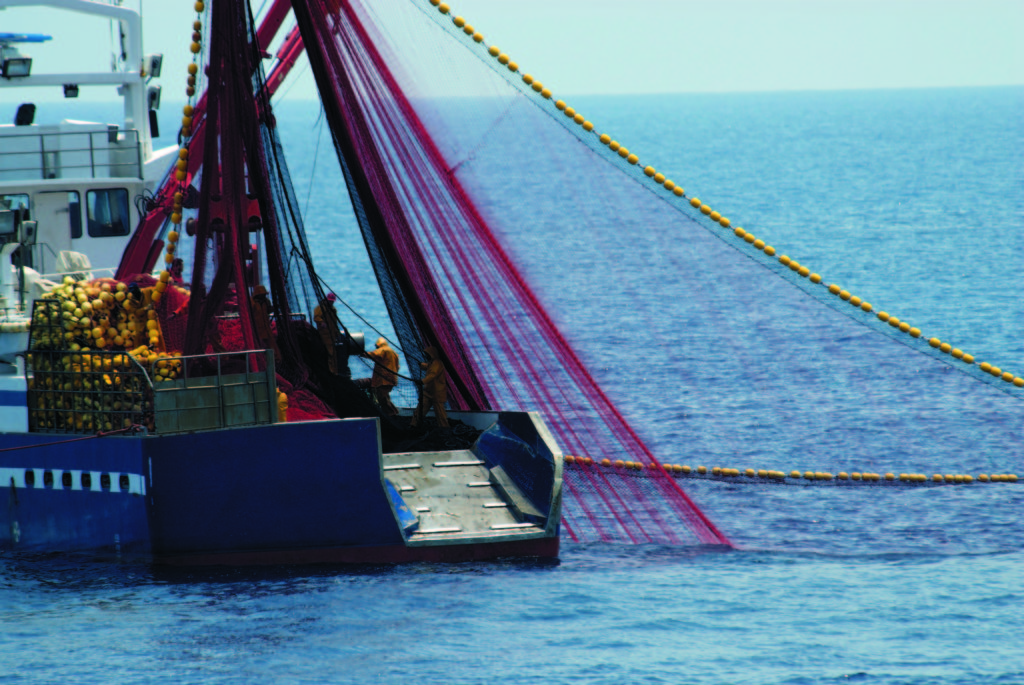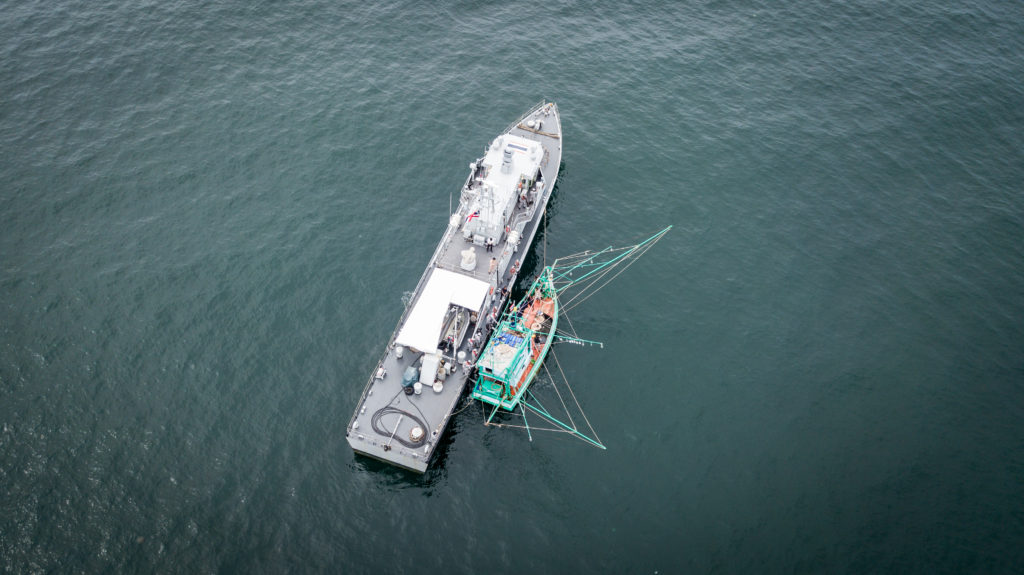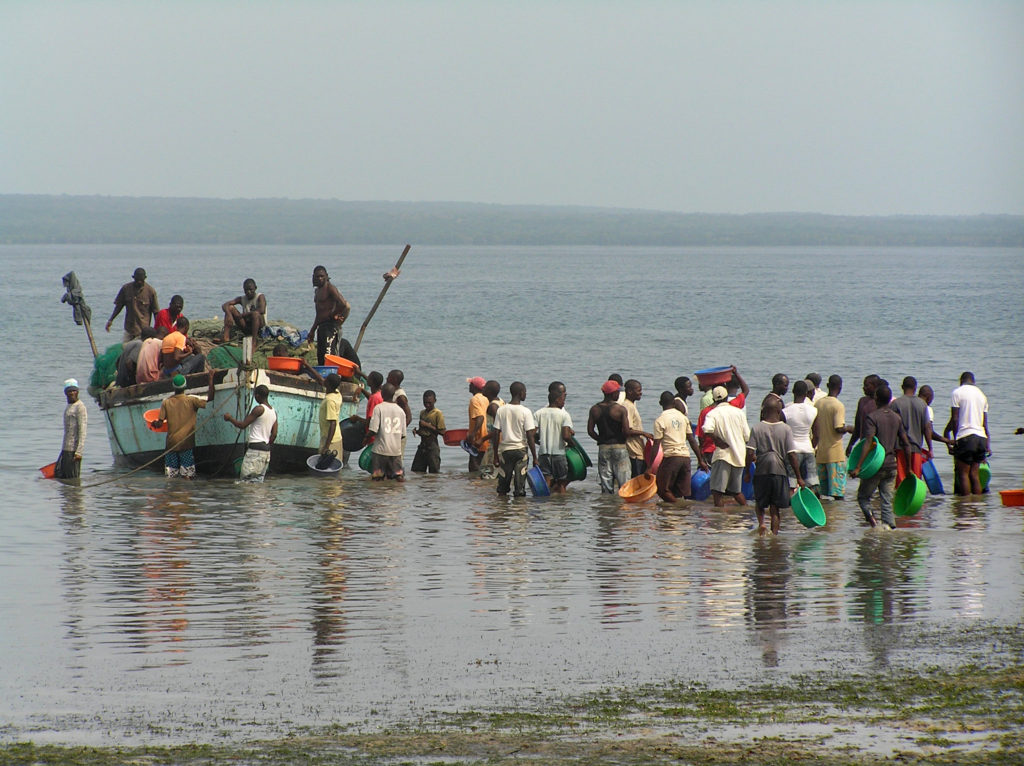Introduction
In a matter of months, the COVID-19 pandemic has created a global public health crisis unprecedented in scale. It has fundamentally changed the lives and daily interactions of billions of people and has highlighted important questions about society’s relationship with the planet, our dependence on natural resources and the sustainability of current systems of food production and consumption.
National and international institutions are actively trying to mitigate the associated health, social and economic consequences of the virus that ripple across different communities, industries and geographies. The fishing industry is no exception. Changing consumer demands, reduced access to markets and measures taken to address the spread of the virus, such as strict social distancing and restrictions in international travel pose serious challenges to the seafood industry. Particularly vulnerable are small-scale fishers and fish workers, many of whom have seen the onset of COVID-19 exacerbate the instability that too often characterises their livelihoods by reducing income and worsening issues of food insecurity.
The EU IUU Coalition (The Environmental Justice Foundation, Oceana, The Nature Conservancy and WWF) are working together to combat illegal, unreported and unregulated (IUU) fishing. In the current context, it is of concern that the political and socio-economic conditions arising as a result of COVID-19 may create an enabling environment for unscrupulous actors to undertake IUU fishing or to facilitate its trade. An upturn in IUU fishing would come with a host of negative socio-ecological and economic consequences and furthermore would likely compound the vulnerability already being experienced by small-scale fishing communities. This blog outlines how an upturn in IUU fishing may manifest and urges the European Union (EU) to lead in efforts to improve fisheries governance and tackle IUU fishing in the wake of COVID-19.

Potential impacts of COVID-19 on the increase in IUU Fishing
1. Labour conditions on board fishing vessel deteriorating in response to ill-health and restrictions on movement
Labour conditions on fishing vessels have long been of concern to many in the industry. Lengthy working hours, insufficient access to health and safety equipment and unhygienic living and working spaces are commonplace on board many vessels. These conditions often go unseen and unreported, as a significant proportion of the global fleet’s workforce are migrant workers, with precarious or non-existent contracts and little to no access to legal or humanitarian recourse.
The potential for labour conditions to worsen has been identified as a problem in light of COVID-19 by the United Nations Food and Agriculture Organization (UNFAO). In April, the organisation highlighted this as an issue as crews may be reduced in size due to illness and restrictions on movement. This may place remaining crewmembers under pressure to work beyond permitted hours, in unsafe conditions and further risk the chance of injury or death whilst at sea.
2. COVID-19 linked economic downturn leading to an increase in IUU fishing and associated crimes
The fishing industry has suffered a considerable economic shock as a result of COVID-19, with global prices for many species falling amid changes in consumer preference and through the closure of restaurants, borders and ports. It has been reported that global seafood exports in 2020 may be reduced by up to a third, leading to concerns around job losses and reduced income for fishers and processors. Satellite observations by the international non-profit organisation Global Fishing Watch have identified instances of huge regional drops in fishing activities. These include an approximate 80% reduction in fishing activities within the Peruvian fleet following the government’s stay-at-home orders in March and fishing in China’s EEZ reduced by an estimated 1.2 million hours.With short term revenues declining due to the pandemic, there is a credible risk that operators might resort to unsustainable or illegal fishing practices as well as other associated crimes to drive down operational costs and recuperate losses, especially when restrictions are lifted. Diminishing profitability has previously been linked with increases in human rights abuses, in which vulnerable workers are exploited so as to reduce outgoings. These crimes are enabled by the uniquely opaque nature of the global seafood industry, which operates both in physically remote locations and under a relatively weak global governance framework.
3. Reduction in the capacity to monitor vessels
As a result of COVID-19, we believe that some countries and Regional Fisheries Management Organisations (RFMOs) may be more vulnerable to IUU fishing within their jurisdiction due to reduced capacity to monitor vessel behaviours either remotely or in person.
Several authorities have removed their observers from fishing vessels due to understandable concerns around their health and the spread of the virus. Canadian fishing authorities, for example, have either removed or limited observer presence on their vessels since the 2nd of April due to the outbreak of the pandemic. Likewise, the Indian Ocean Tuna Commission (IOTC) and Western and Central Pacific Fisheries Commission (WCPFC) have suspended their regional observer programmes. Fisheries observers provide a vital function in monitoring catch, bycatch and working conditions, and their absence may allow IUU fishing activities and human rights abuses to go unnoticed and unpunished.
Another monitoring issue flagged in a UNFAO communication is that countries with reduced capacity to monitor vessels due to COVID-19 (such as impacts on staffing-levels and redistribution of funds), may find that those disruptions unwittingly enable IUU fishing. This has happened in the past during pandemics. For example, during the Ebola outbreak in West Africa, it was alleged by some Non-Governmental Organisations that Chinese fishing vessels capitalised on reduced fisheries monitoring to operate illegally.
4. Restricted access to ports leading to an increase in transshipments occurring at sea
Travel restrictions imposed as part of measures to prevent the spread of COVID-19 have created severe logistical issues for the international fisheries trade. Ports worldwide have become increasingly selective of who they allow to enter, and the conditions under which this is permitted. This has made it difficult, or in some locations impossible, for fishing vessels to transship their catch in port. As a result, fishing vessels are being directed to undertake their transshipment at sea, facilitated in some cases by the temporary loosening or suspension of regulations that ban at sea transshipment by purse seiners. Furthermore, many observer programs that were established to mitigate this risk have been suspended.
At sea transshipment is a practice that comes with associated risks in the context of IUU fishing, often occurring in remote locations away from port or other authorities. A primary concern is that it enables the ability to ‘launder’ IUU fish, i.e. mixing it with legitimately caught fish, making the legality of catch almost impossible to ascertain. These changes also reduce the opportunities to inspect vessels that may identify poor labour and working conditions on board, isolating vulnerable crewmembers who can be kept at sea for longer periods of time.

5. Disruption to RFMO meetings may delay and/or diminish efforts to improve conservation and management measures (CMMs)
Meetings of RFMOs, at which conservation and management measures are proposed, discussed and potentially adopted are under huge pressure. Delayed, cancelled or stripped back to only discuss ‘essential’ issues, the transparency and management functions of these meetings are being undermined. For example, the International Commission for the Conservation of Atlantic Tuna (ICCAT) has announced the cancellation of both their ‘Standing Committee on Research and Statistics (SCRS)’ meeting due to be held September to October 2020, and the Commission meeting due to be held in November 2020. The next regular meeting of the Commission will now be in November 2021, leaving a number of contracting and cooperating non-contracting parties concerned at the potential prospect of no new CMMs to be proposed and/or implemented in this period.
Beyond the implications of these delays, there are also signs that actors are attempting to weaken or suspend existing conservation and management measures. Nineteen organisations have previously communicated their concern that efforts were being made “to relax or, in some cases, suspend important monitoring, control and surveillance measures (MCS) for commercial fisheries indefinitely and without further consideration”.
How to act? Post-Covid-19 recommendations for the European Union
With COVID-19 threatening to create an enabling environment for IUU fishing and to further increase the pressure on stocks and fisheries management capacities, fisheries governance stands at a crossroads. The pandemic has highlighted the need and the benefits of information sharing and increased transparency. With this in mind, policymakers and actors across the sector must act now to make necessary changes to ensure our oceans are sustainable, resilient, and free of the criminality and abuses that have blighted them for so long.
The EU is the largest importer of seafood globally, and as such, has considerable capacity to drive reform through market-based measures, as evidenced by the EU IUU Regulations. Beyond this, it also has a globally active fishing fleet and is a key actor in a number of RFMOs. In the wake of the COVID-19 pandemic, we recommend that the EU focus their efforts on implementing, and encouraging others to implement, the following measures. Doing so will safeguard vulnerable communities, increase transparency and improve global fisheries in order to create healthy, prosperous and resilient oceans.
Implement Remote Electronic Monitoring (REM) on board fishing vessels
With the uncertainty surrounding COVID-19, in particular, the duration of this first wave, the possibility of a second wave, and a reduction in the amount of human observer coverage, remote electronic monitoring takes on increased importance. The installation of REM on board fishing vessels, consisting of closed-circuit television systems and electronic net/gear sensors, would mark a significant step towards reducing IUU fishing amongst the world’s fleet. Information provided by these systems enables both the cross-checking of logbook data and the confirmation of vessel compliance with regulations. Monitoring vessel behaviours electronically has a multitude of benefits including improved worker welfare, encouraging legal and sustainable fishing operations and reducing the reliance on human observers who might be victims of intimidation, bribery, physical and verbal abuse and in extreme cases murder.
Ensure full traceability along the value chain to avoid fish products caught through IUU fishing from ending up on the plates of EU consumers
Ensuring transparency and traceability ‘from bait to plate’ is the most effective way of ensuring that seafood does not derive from IUU fishing. COVID-19 has seen a reduction in sales of fresh fish and an initial spike in canned products. However, canned products are generally subject to less stringent traceability requirements along the supply chain of processed seafood, as they are currently exempt from some EU traceability rules (e.g. Article 58 of the EU fisheries control regulation).
Market States, and particularly those that rely heavily on seafood imports, should be encouraged to design and implement robust and harmonised unilateral import schemes to prevent fish caught through IUU fishing from entering their markets. A recently published EU IUU Coalition report highlights industry best standards for such schemes and outlines the key data elements accompanying imported seafood that should be incorporated to facilitate the exchange of information worldwide and maximise traceability. In addition, the EU should improve the information that is required for imports of seafood products and ensure that lots (i.e. batches) of seafood are traceable throughout the supply chain.
Strengthen/improve good governance mechanisms and encourage the uptake of international commitments to end IUU fishing
The EU IUU Coalition recommends that policymakers implement measures that improve governance and transparency, namely those listed in our set of essential criteria to end IUU fishing. Included within the criteria are clear and affordable measures that can be implemented immediately, using existing frameworks and technologies. Combining national level actions with the robust implementation of global measures outlined in agreements such as the Port State Measures Agreement, the International Maritime Organization (IMO) Cape Town Agreement and the International Labour Organization (ILO) Work in Fishing Convention, serves to strategically tackle IUU fishing and associated issues using a multi-faceted approach.
Enable the identification of vessels and tracking of their activities
EU decision-makers and the fisheries industry must collectively strive to ensure transparency in fishing activities by implementing tools that allow full documentation of fishing vessels operating both in national waters and areas beyond national jurisdiction. RFMOs are of particular importance in governing the latter, and as such contracting parties should be encouraged to adopt and implement measures that seek to address IUU fishing. Examples of such measures include improvements in vessel tracking; monitoring or banning transshipments at sea; public, complete, up to date and accessible authorised vessel lists; automatic recognition and cross-listing of IUU vessels; and also requiring that all eligible vessels be registered with an IMO number.
Ensure sufficient resources are available to institutions that are instrumental to effective global fisheries management, and to fishing communities most impacted by COVID-19
The economic costs of coping with COVID-19 are significant, with potential implications for the global capacity to monitor and prevent IUU fishing. It is imperative that every effort is taken by the EU to ensure that relevant institutions retain the financial and operational capacity to continue the fight against IUU fishing. Beyond this, we also call upon the EU to strive for capacity to be preserved and built elsewhere, particularly in those countries and regions where IUU fishing is endemic or where a strain on resources following COVID may lead to reduced monitoring.
The transboundary nature of IUU fishing means that a targeted approach such as this will reap global rewards, and ensure the already high economic toll that IUU fishing takes on economies worldwide is not exacerbated. This can be achieved through not only financial support but also through the effective sharing of data and intelligence between states, industry, civil society and RFMOs. COVID-19 has demonstrated that in the interests of a greater good data which could be considered private, can be more openly shared with the appropriate authorities if the need is great enough.
In parallel, we urge the EU to lead a cross-sectoral effort in supporting those fishing communities deemed highly vulnerable to the direct and indirect consequences on the pandemic. In such communities, the onset of COVID-19 is felt at the intersection of existing vulnerabilities making the impacts on health and livelihoods all the more acute. Financial and logistical assistance should be made available to those communities identified as the worst hit, ensuring that access to these resources is equitable and reaches those within communities who may be disproportionately impacted and less represented.

